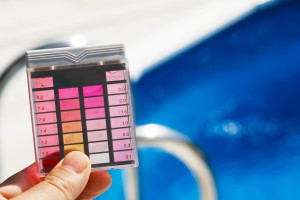There are a lot of commercial swimming pool test kits available on the market. Generally, some may be more popular than others but all come very close on their accuracy, assuming they are used correctly. So, how do you determine which type will be best for you and your facility?
First, start by understanding the main types of test kits, which are colorimetric (color matching), titrimetric (color changing), turbidimetric (measuring cloudiness of the water) photometric (measured using a photometer) and digital (measured using digital sensors). One test kit can include more than one type of test. The most common tests found pool side tend to be kits that offer a combo of the first three, where the operator manually adds reagents drops to the test sample in order to obtain the result. With photometric, a pre-measured reagent (or reagent combo) is added to the water sample and the sample is then measured by a beam of light inside a calibrated electronic device. Digital devices tend to just get dipped into the water sample to acquire a reading (chemistry controller sensors fall into this category).
Then, ask yourself these questions to see which might be the better fit for you:
[list type=”check”]
- What is your budget? Generally, photometric and digital test kits are more expensive than the other options. The upfront costs for photometric in particular can be quite high, where as the others typically come in under $200.
- Who takes the tests? If you are the only person, or one of few people, who test the pool water, colorimetric/titrimetric tests may be a good option for you. If many different people will be taking measurements, photometric may be worth the investment. With colorimetric tests in particular, the result can vary from person to person depending on their own visual acuity. Men tend to have more issues with colorblindness than women, our eyesight tends to worsen as we age, and we all will vary slightly in our opinion of a particular color shade. The light and background (walls, etc) also can affect the results of a colorimetric test. Photometric takes the guess out of the game. Since the photometer itself measures the sample, it does not matter who takes the test or how many people do so throughout the day/week, as long as the steps are followed properly, the results will be accurate and consistent.
- What do you need to test? Most pool test kits cover the basics – pH, total and free (or free and combined) chlorine, total alkalinity, calcium hardness, and cyanuric acid. Many will go above and beyond, depending on what you need. Metals, salinity, temperature, and phosphates are just a few of the many additional test options that a kit may be able to handle. You may opt for a larger kit, such as a high end photometric, that can test for just about anything. Or, you may find that a more basic color/titrimetric kit along with an additional individual test or two may suit your needs better.
- What is the availability of reagents? Would you rather be able to buy supplies locally, or are you comfortable making regular orders to have your reagents shipped to you? Many pool operators prefer a test kit that is available on the shelves of their local supply company, so that reagents are easily replaceable when they run low.
- Does your state have any legal requirements that will dictate your choice? Many pool operators forget to check with their state regulations when it comes to their test kit. The state will likely have a set of parameters that they want your kit to fall into, although they may go above and beyond by requiring digital meters for certain tests. Checking your local regs before you buy is always the safe bet.
[/list]
Take a minute to go over those questions with your employees, bosses, or co-workers, if that applies. Talk to them about what they think would best suit the needs of the facility. This should hopefully lead you to the best test kit for you.
What do you use? Why did you choose it, if the choice was yours? If you could change the way you test the water, would you? In what way? We’d love to hear what you have to say.


